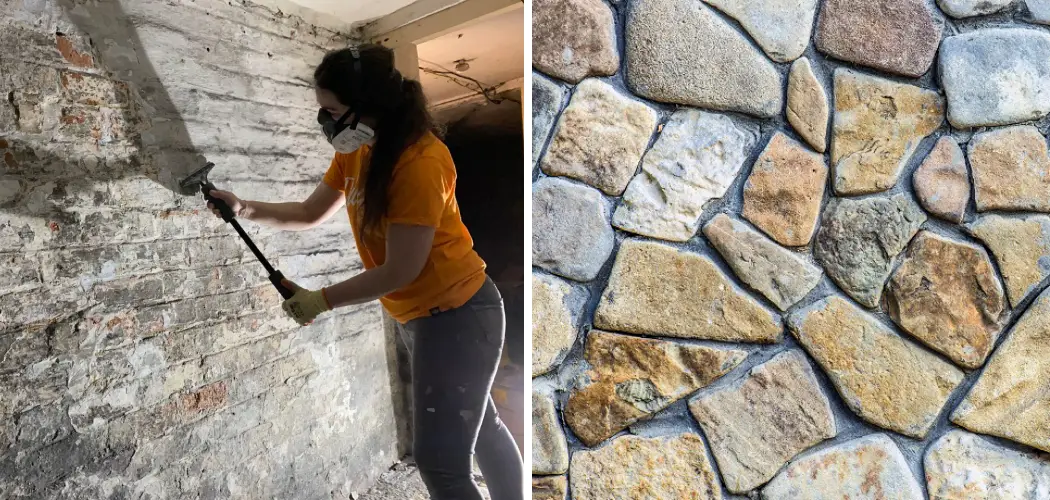Are you ready to tackle the challenge of cleaning your stone basement walls? Whether you’re dealing with accumulated dust or more serious dirt and grime, it’s essential that your stone walls are kept clean and in good condition.
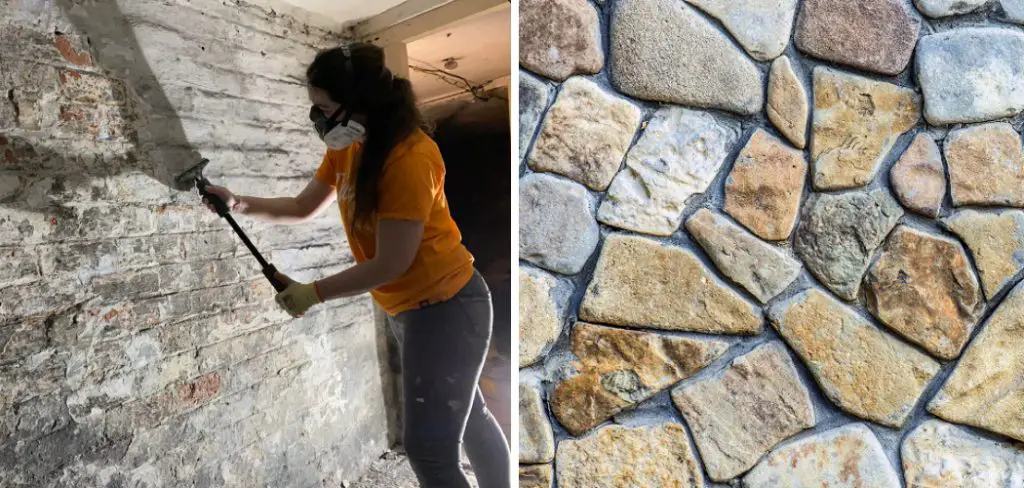
In this article, we’ll provide some tips on how to safely handle the task of deep-cleaning your stone walls without damaging them. We’ll also include information about preventative maintenance so that you can keep your rock from getting dirty in the first place and preserve its beauty for years to come. So strap in and get ready; let’s dive into our top-notch guide on how to clean stone basement walls!
9 Best Ways on How to Clean Stone Basement Walls
1. Dust Your Stone Walls Regularly:
Regular dusting is the key to keeping your stone surfaces looking good and preventing dirt buildup. Use a soft, microfiber cloth or a vacuum cleaner with an upholstery attachment to remove debris from the surfaces of your rock walls. This method should be done on a weekly basis and is especially important in areas prone to excessive dust or dirt.
2. Use Warm, Soapy Water for General Cleaning:
For regular cleanings, use warm, soapy water at a maximum temperature of 85°F (29°C). A mild soap solution should do the trick; avoid using harsh chemicals that could damage the stone. Gently wipe away dirt and grime with a soft cloth, making sure to rinse all surfaces thoroughly afterward.
3. Dilute Vinegar for Tougher Stains:
For more difficult spots or stains on your stone walls, you can use diluted vinegar as a cleaning solution. Mix one part white vinegar with four parts warm water and pour into a spray bottle. Spray the mixture onto the surface and let it sit for about five minutes before wiping it away with a soft, damp cloth.
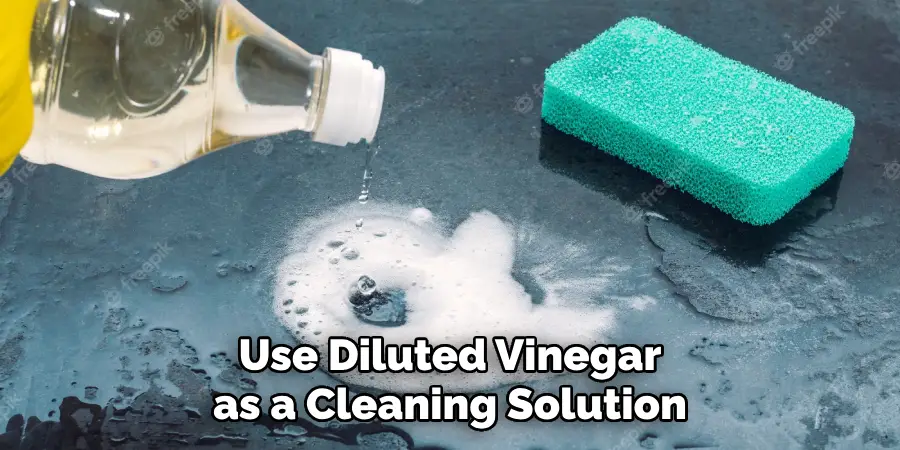
4. Scrubbing Can Be Used in Certain Cases:
In some instances, you may need to use scrubbing to get rid of tough stains on your stone walls. Use a nylon brush or pad with just enough pressure to remove dirt and debris, but without scratching the stone. Make sure to use a circular motion when scrubbing so that you don’t damage the surface of your walls.
5. Use Sealants to Protect the Stone:
Applying a sealant is a great way to protect your stone surfaces from dirt and other stains. A quality sealant will allow dirt or liquid to bead up on the surface, making it easier to clean and protect your walls from any damage. This process should be done annually or as needed to prevent dirt and debris from building up.
6. Don’t Use Acidic Cleaners:
Acidic cleaners such as vinegar, ammonia, and bleach should be avoided when cleaning stone basement walls. These harsh chemicals can eat away at the sealant and cause discoloration or staining of the stone. Opt for pH-neutral cleaners, such as mild soap, for regular cleanings.
7. Try Steam Cleaning:
Steam cleaning is an effective way to remove dirt and grime from stone surfaces without the use of harsh chemicals. Use a steamer with adjustable temperatures and steam away dirt and debris. Make sure to keep the nozzle a safe distance away from the walls to avoid damaging them with heat.
8. Consider Professional Cleaning Services:
If your stone surfaces are severely stained or dirty, you may want to consider hiring a professional cleaning service. These companies specialize in deep cleaning and can use special techniques and products to remove tough stains without damaging your stone walls.

9. Maintenance Is Key:
One of the best ways to keep your stone walls looking great is to practice regular maintenance. Dust and vacuum surfaces regularly, wipe down walls with a mild soap solution, and apply a sealant as needed. These steps will help prevent dirt buildup and protect your stone for years to come.
We hope you found our guide on how to clean stone basement walls helpful! With the tips in this article, you’ll have all the information and resources needed to keep your rock looking its best. So get out there and start cleaning – we know that your stone walls will thank you for it!
Additional Tips and Tricks to Clean Stone Basement Walls
1. Use protective coverings when doing any work on or near the stone walls, such as a drop cloth or plastic sheeting. This will help protect the stones from any damage that could be caused by the tools being used.
2. If possible, use a wet/dry vacuum to clean up any debris that may have been created during the cleaning process. This will help ensure that no dust or particles remain on the stones after they’ve been cleaned.
3. It is important to make sure that all cleaners and detergents are nonabrasive. Abrasive cleaners can easily damage the stone, leaving it looking dull and lackluster.
4. When using any type of chemical cleaner or detergent, be sure to follow the directions on the product label. It is important to wear protective gloves when handling these products and make sure that all residue is thoroughly rinsed away with clean water.
5. If your stone basement walls are very dirty or have stubborn stains, you may need to use a stronger cleaner. Be sure to use one that is specifically designed for stone so that it does not damage the surface.
6. Once the cleaning process has been completed, apply a sealant to help protect the stones from moisture and staining. This will help ensure that your basement walls look their best and last for years to come.
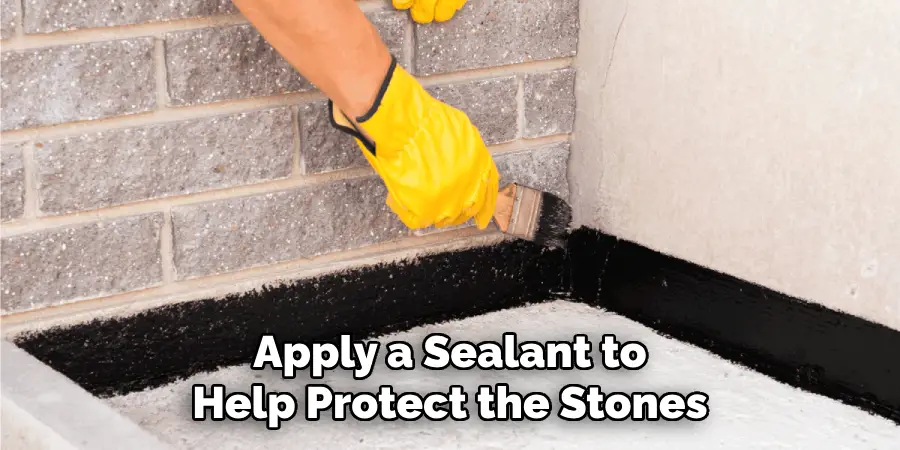
7. After the sealant has been applied, it is important to regularly inspect the walls and any areas around them for signs of staining or damage. This will help maintain their appearance and ensure that they remain in good condition.
Following these tips and tricks will help you properly clean your stone basement walls and keep them looking their best for years to come. It is important to be as gentle and careful as possible when cleaning the stones, and using the right products will make all the difference in the end result. With a little bit of effort, you can keep your stone basement walls looking beautiful and like new!
Frequently Asked Questions
What Should I Do if the Stone Walls in My Basement Are Growing Mold or Mildew?
For mold and mildew growth, it’s best to use a commercial cleaning agent specifically designed for stone surfaces. Make sure to follow the instructions on the product label and test an inconspicuous area first to ensure that there is no staining or discoloration. Once the cleaning agent has been applied, rinse with warm water and dry with a clean cloth.
How Often Should I Clean Stone Basement Walls?
The frequency of cleaning will depend on the amount of moisture in the basement as well as any other environmental factors that could contribute to dirt or debris buildup. Generally speaking, stone basement walls should be wiped down and inspected on a monthly basis. If necessary, use a mild detergent solution to clean any spots or stains that have accumulated over time.
What Types of Products Should I Avoid Using When Cleaning Stone Basement Walls?
It’s important to avoid using harsh chemical cleaners or abrasive pads as these can damage the stone surface. Additionally, never use bleach or other strong acidic products as these can cause irreparable discoloration. It is also best to avoid using steel wool or similar cleaning tools as these could leave behind scratches.
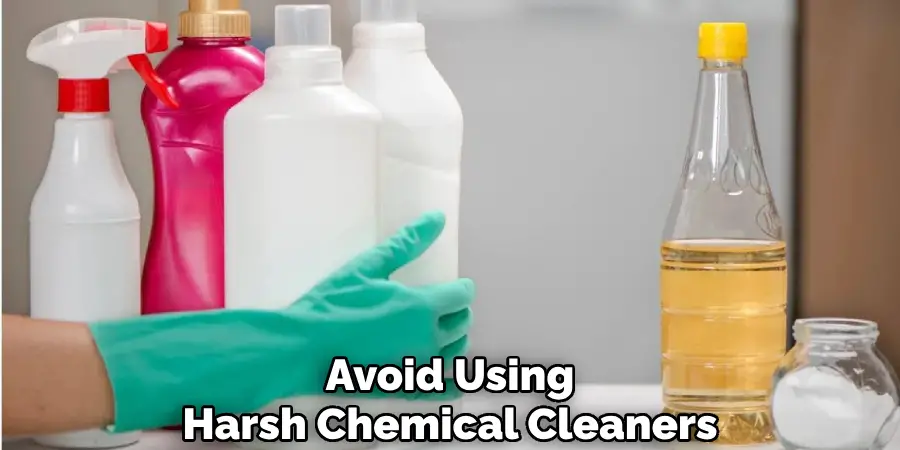
Is There Anything Else I Should Know About Cleaning Stone Basement Walls?
When cleaning stone basement walls, be sure to use a damp cloth rather than a wet one. Using too much water can cause staining and discoloration, so it’s best to limit the amount of moisture used when cleaning. Additionally, you should also make sure that any dirt or debris is removed before drying with a clean cloth. This will help ensure that there are no streaks or smudges left behind.
Is There a Way to Protect Stone Basement Walls from Future Stains and Discoloration?
One of the best ways to protect stone basement walls from future stains and discoloration is by using a sealant. This will help keep dirt, water, and other contaminants away while also providing an extra layer of protection against wear and tear. Be sure to read the instructions on the sealant carefully so that you apply it properly. Additionally, reapply the sealant every few months or as needed in order to maximize its effectiveness.
Conclusion
Overall, keeping your stone basement walls clean is an important part of upholding their general appearance, durability, and effectiveness. Besides the recommended cleansers mentioned above, you also have the option to hire a professional with specialized equipment and materials to make sure that your basement looks sparkling new again. Be sure to always follow safety protocols when cleaning stone walls as some of the chemicals can be dangerous if not used properly.
Keeping track of how often you need to clean and noticing any signs of damage more regularly will help your basement last longer. Stone basements may seem daunting but following this guide can help you have that beautiful and clean stone basement wall look that can last for generations! So gather up all the necessary products, put on a pair of protective gloves, and start scrubbing away – take control of How to Clean Stone Basement Walls today!

